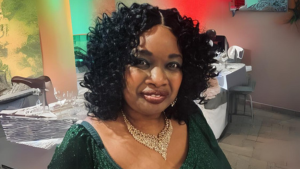
22 Jul Good luck shutting me up!

Born in Winnipeg, Manitoba, I was raised by a proud, independent Guyanese woman who worked three jobs to keep a roof over me and my siblings’ heads. On the night I was born, I lost oxygen, causing damage to the language area of my brain. When I was young the only one who could understand me was my big sister. Mrs. Keely Gilmore, my speech therapist, diagnosed me with childhood apraxia of speech (CAS) when I was in elementary school.
Although I have CAS, I am intelligent, and I felt my elementary teachers never academically challenged me enough. I did have a teaching assistant who would challenge me or require me to work hard, and I appreciated their support. In my younger years, children who didn’t understand me would tease me, but junior high and high school were better. I also suffered from epilepsy during my childhood, too, adding even more hurdles to my daily life.
I went to my speech teacher for years. My biggest struggle was and is learning to speak slower. Many times, people don’t understand me because I speak too fast. Also, making R sounds is difficult. Apraxia continues to affect my daily life as an adult – I still become very frustrated when I can’t say certain words and recently got flippers because one of my teeth broke off. I’m learning to speak with it.
Finding a job was hard, too. During the interview process, even if it went great, I felt I had to prove that my disability would not be a barrier in order to be recognized as a good candidate for a position. At times, it seemed that I was overlooked based on the supports I would need to succeed. It was tough, but I am tougher.
Overcoming those struggles was a great accomplishment, but some of my proudest moments were graduating high school and winning a humanitarian award. I like to volunteer and do things at school. I even did the student announcements that were shown on television during school hours. The recognition made me feel like my efforts were valued. I would encourage all students to try and be involved in school activities, especially those with apraxia. Don’t let it stop you!
My advice to those with childhood apraxia of speech is this; Apraxia is not a weakness but a strength you can use to become stronger. My advice to their families and loved ones is – Don’t give up on us and just be there and give us support.
As you can see, I keep fighting. Apraxia doesn’t stop me – Good luck shutting me up!

Be inspired by more stories today and learn about how you can Give Hope!
Visit, FIND HOPE, GIVE HOPE

Born in Winnipeg, Manitoba, I was raised by a proud, independent Guyanese woman who worked three jobs to keep a roof over me and my siblings’ heads. On the night I was born, I lost oxygen, causing damage to the language area of my brain. When I was young the only one who could understand me was my big sister. Mrs. Keely Gilmore, my speech therapist, diagnosed me with childhood apraxia of speech (CAS) when I was in elementary school.
Although I have CAS, I am intelligent, and I felt my elementary teachers never academically challenged me enough. I did have a teaching assistant who would challenge me or require me to work hard, and I appreciated their support. In my younger years, children who didn’t understand me would tease me, but junior high and high school were better. I also suffered from epilepsy during my childhood, too, adding even more hurdles to my daily life.
I went to my speech teacher for years. My biggest struggle was and is learning to speak slower. Many times, people don’t understand me because I speak too fast. Also, making R sounds is difficult. Apraxia continues to affect my daily life as an adult – I still become very frustrated when I can’t say certain words and recently got flippers because one of my teeth broke off. I’m learning to speak with it.
Finding a job was hard, too. During the interview process, even if it went great, I felt I had to prove that my disability would not be a barrier in order to be recognized as a good candidate for a position. At times, it seemed that I was overlooked based on the supports I would need to succeed. It was tough, but I am tougher.
Overcoming those struggles was a great accomplishment, but some of my proudest moments were graduating high school and winning a humanitarian award. I like to volunteer and do things at school. I even did the student announcements that were shown on television during school hours. The recognition made me feel like my efforts were valued. I would encourage all students to try and be involved in school activities, especially those with apraxia. Don’t let it stop you!
My advice to those with childhood apraxia of speech is this; Apraxia is not a weakness but a strength you can use to become stronger. My advice to their families and loved ones is – Don’t give up on us and just be there and give us support.
As you can see, I keep fighting. Apraxia doesn’t stop me – Good luck shutting me up!

Be inspired by more stories today and learn about how you can Give Hope!
Visit, FIND HOPE, GIVE HOPE
Credentials:
Hours of Operation:
Treatment locations:
Address:
,
Phone:
Email:
Overall Treatment Approach:
Percent of CAS cases:
Parent Involvement:
Community Involvement:
Professional consultation/collaboration:
Min Age Treated:
Max Age Treated:
Insurance Accepted:




